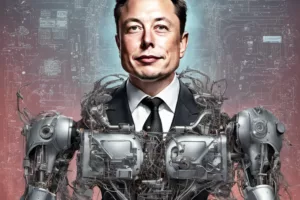
Forecasted to reach $59bn by 2028, generative AI is revolutionizing industries and raising concerns about job automation and humanity’s future.
Generative artificial intelligence (AI) is rapidly transforming various sectors, from marketing to insurance, with its ability to generate complex media by learning from vast amounts of online data. As the market for generative AI continues to expand, experts predict that its global value will skyrocket from $6bn this year to an astounding $59bn by 2028. This exponential growth has sparked both excitement and apprehension, as supporters hail the technology’s potential for increased productivity, while others express concerns about job displacement and potential risks to humanity. In this article, we explore the multifaceted landscape of generative AI, examining its growth potential, dominant players, real-life applications, and the need for careful oversight.
The Consumer Market Takes the Lead in Revenue Generation
The consumer market is projected to experience the fastest growth in generative AI, with revenues expected to reach approximately $11bn by 2028, according to research conducted by Omdia. This surge can be attributed to the integration of AI in search engines, writing assistants, and artwork production. Following closely behind is the media and entertainment sector, forecasted to generate $8bn in revenue. The healthcare, business, and automotive markets are also poised to embrace generative AI, contributing to the overall market expansion.
Dominant Players and Three Categories of Generative AI Businesses
The generative AI market is comprised of three main categories: creators of massive “foundation models,” providers of necessary infrastructure, and developers of software tailored to specific industries or tasks. The creation of foundation models, trained on vast amounts of internet data, is dominated by companies like OpenAI, Google, and Anthropic. In terms of infrastructure, Amazon Web Services and Nvidia play pivotal roles, providing the computing power required for AI applications. The third category encompasses a wider range of companies, developing products that utilize generative AI for automation and optimization.
Real-Life Applications: Marketing, Legal Services, and Insurance
Generative AI is revolutionizing various sectors, including marketing, legal services, and insurance. Companies like Jasper, based in Texas, leverage generative AI to automate marketing campaigns and social media posts, optimizing the work of human marketers rather than replacing them. Legal firms, such as Womble Bond Dickinson, utilize generative AI software to streamline tasks like brainstorming ideas and drafting documents, enhancing client services. Insurance technology supplier Cytora employs generative AI to automate data analysis and risk assessment, ultimately improving underwriters’ output.
The Need for Careful Oversight and Ethical Considerations
While generative AI offers numerous benefits, emerging flaws, such as the creation of false information, highlight the need for careful oversight. Companies like Womble Bond Dickinson emphasize the importance of human review in ensuring the accuracy and reliability of generative AI software. As the market matures, smaller suppliers may face challenges, leading to consolidation, similar to what occurred in the automotive market in the 1930s. Ethical considerations regarding job displacement and the potential risks associated with generative AI’s advancements must also be addressed.
Consumer Applications and Tech Giants’ Innovations
Generative AI’s impact on consumers is growing rapidly, with new applications emerging. For instance, messaging app WhatsApp is developing a tool that can instantly generate cartoons upon request, showcasing the technology’s creative potential. Meta, the parent company of WhatsApp, Facebook, and Instagram, is developing an AI assistant that can provide information on various topics within group chats. Microsoft has also announced the inclusion of a generative AI-powered assistant called Copilot in its Office software, offering enhanced productivity for an additional cost.
The generative AI market is poised for explosive growth, with forecasts predicting a staggering $59bn valuation by 2028. While the technology holds immense potential for increased productivity and automation in various industries, concerns about job displacement and ethical considerations persist. As dominant players continue to shape the market, smaller suppliers may face challenges, leading to consolidation. As generative AI continues to revolutionize sectors like marketing, legal services, and insurance, careful oversight and ethical practices are crucial to harnessing its benefits while mitigating potential risks. The future of generative AI holds both promise and responsibility, necessitating a delicate balance between innovation and ethical considerations.

John Ravenporton is a writer for many popular online publications. John is now our chief editor at DailyTechFeed. John specializes in Crypto, Software, Computer, and Tech related articles.




